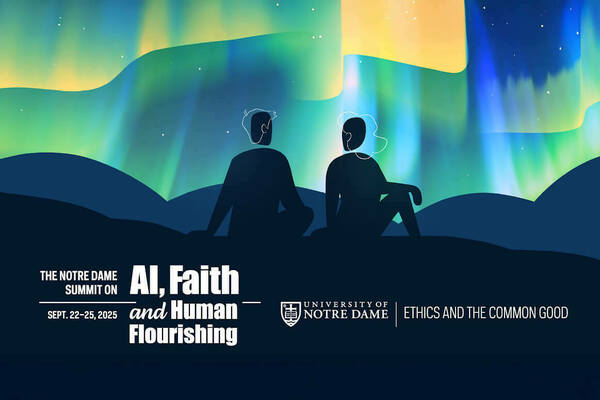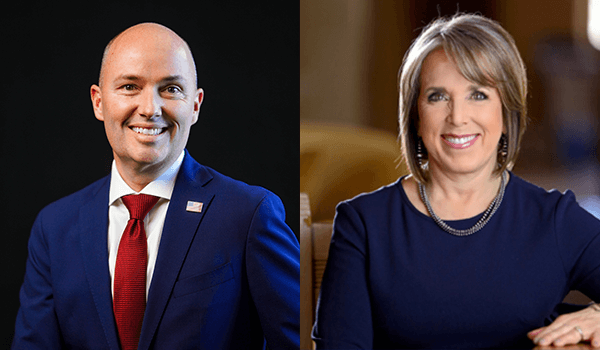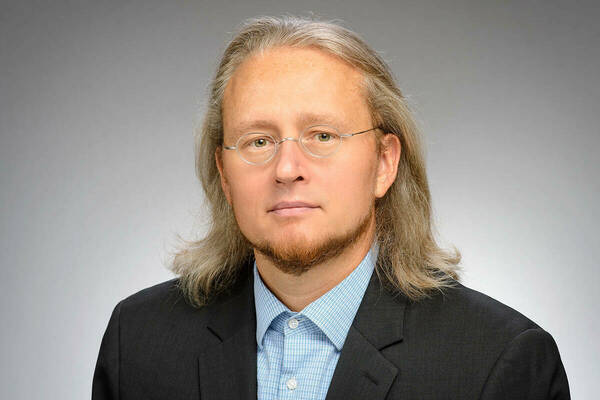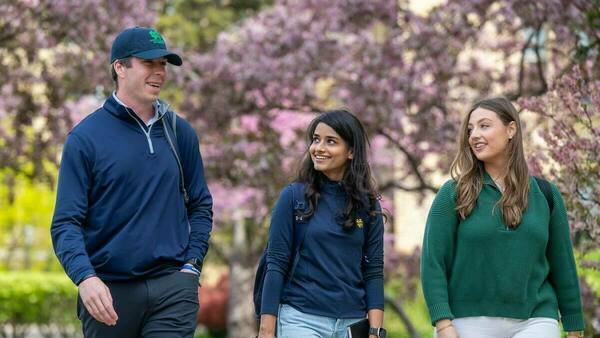English majors share love of reading with Boys & Girls Clubs of St. Joseph County
University of Notre Dame English majors are taking their passion for reading into the South Bend community by serving as literacy volunteers with the Boys & Girls Clubs of St. Joseph County.
The opportunity, which kicked off in the fall 2022 semester, has English majors spending one to two hours per week reading books, tutoring and spending quality time with kids enrolled in an after-school program called STRIVE.
The Notre Dame Robinson Community Learning Center (RCLC) is a partner in STRIVE. RCLC staff train literacy tutors to work at each of the program sites and to implement its conflict resolution program at the sites. The center also serves as a program site itself.
According to Susie Brennan, director of strategic partnerships at Boys & Girls Clubs, many of the kids the agency serves in St. Joseph County read well below grade level. These children need support in literacy, math fluency, social and emotional learning and college and career readiness, and STRIVE is designed to meet those needs.
However, literacy is key to making strides in post-pandemic learning loss across disciplines. “If you can’t read, it makes learning more difficult across the board,” Brennan said. “We want to give the kids the foundation they need to succeed in all subjects.”
This after-school program operates in 22 club sites in four school districts across the county, serving more than 1,400 K-12 students at no cost to families. Most kids enrolled in the program qualify for free or reduced-price lunch, a common benchmark in education to indicate a significant socioeconomic need.
The outcomes of STRIVE after-school programming are significant. In just one year, 64 percent of children served improved one or more grade levels in literacy, and 20 percent improved two or more grade levels in both literacy and math.
According to Brennan, these outcomes are due, in large part, to Boys & Girls Clubs being able to keep a low ratio of volunteers to kids. The agency aims for a 1:10 ratio, but the children in STRIVE benefit most from the kind of individual attention and passion for reading and learning that English majors are naturally suited to provide.
By volunteering, Notre Dame English majors not only help kids learn, but also have the chance to make meaningful connections. Brennan said that “what really matters” is that kids in Boys & Girls Clubs “get access to adults in our community that they can form positive relationships with.”
Natalia Rodriguez, a first-year student at Notre Dame, first learned about the program through the English department. She signed up right away and has been volunteering with Boys & Girls Clubs for several months.
Rodriguez emphasized how fulfilling she has found her time with Boys & Girls Clubs. “I’ve seen a lot of kids that reminded me of me,” she said, recalling her own experiences in after-school programs in her hometown of Miami. “You want to make that experience enjoyable for them. You want to befriend them, and you want to treat them like they’re not just kids in an after-school program.”
Rodriguez also emphasized how easy it has been to reach her volunteer site. While transportation has long been a challenge for students who want to volunteer off campus, a new city program makes community service accessible. Boys & Girls Clubs volunteers can receive free Uber and Lyft rides thanks to Ride Guarantee, a grant-funded program that covers the cost of ride-sharing services. (The program also helps nonprofit clients and low-income employees in South Bend reach services and work sites.)
Getting to know the greater South Bend community is yet another benefit of volunteering. “As a first-year student I really didn’t know anything about South Bend,” Rodriguez said. “It’s refreshing. You leave campus, you see new faces, you see South Bend.”
While Boys & Girls Clubs of St. Joseph County aims to “inspire and enable all young people, especially those who need us most, to realize their full potential,” the inspiration moves in both directions, Rodriguez said. “We’re both benefiting from coming together and helping the community.”
“I pitch it to my friends all the time,” Rodriguez said. “It’s fun.”
Latest ND NewsWire
- Notre Dame to host summit on AI, faith and human flourishing, introducing new DELTA frameworkThe Institute for Ethics and the Common Good and the Notre Dame Ethics Initiative will host the Notre Dame Summit on AI, Faith and Human Flourishing on the University’s campus from Monday, Sept. 22 through Thursday, Sept. 25. This event will draw together a dynamic, ecumenical group of educators, faith leaders, technologists, journalists, policymakers and young people who believe in the enduring relevance of Christian ethical thought in a world of powerful AI.
- Notre Dame Democracy Initiative hosts bipartisan conversation with Western state governorsTwo Western state governors known to work across the aisle on policy issues such as water, housing and energy will visit the University of Notre Dame for a fireside chat about how Western state pragmatism can serve as a model for the country to overcome polarization.
- In new research, Roy Scranton explores climate change and the limits of human progressIn his most recent book, “Impasse: Climate Change and the Limits of Progress,” Scranton, an associate professor of English, defines the impasse he sees as “not only political and institutional, but cognitive, existential and narrative” and asserts that the only path forward is through embracing what he terms ethical pessimism. “A lot of people confuse pessimism with nihilism, apathy and despair,” Scranton said. “But pessimism is actually about recognizing our limits, letting go of unrealistic goals, finding solidarity in the fact of human suffering and doing what you can now, not in some utopian future.
- Notre Dame MBA launches deferred admission programThe Notre Dame MBA Deferred Admission Program allows candidates with little or no work experience, including college seniors, to secure admission before reaching the recommended three years of work experience to enroll.
- ‘Prebunking’ false election claims may boost trust in electionsIn recent years, democracies worldwide have seen a growing erosion of trust in election outcomes and institutions, driven in part by fears of widespread fraud. New Notre Dame research finds that “prebunking” — providing accurate information before false claims spread — boosts trust in elections more effectively than traditional fact-checking.
- ND experts on the canonization of Carlo AcutisAs the Church awaits the ceremony in St. Peter’s Square, where Pope Leo XIV will formally declare Acutis a saint, University of Notre Dame experts Kathleen Sprows Cummings, Brett Robinson and Timothy O’Malley reflect on his life and his path to sainthood.













